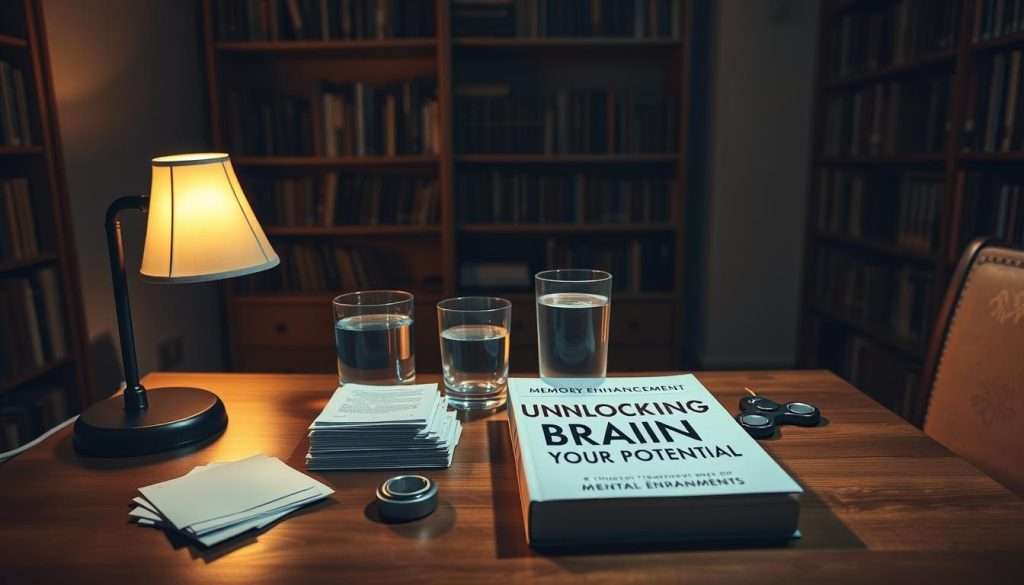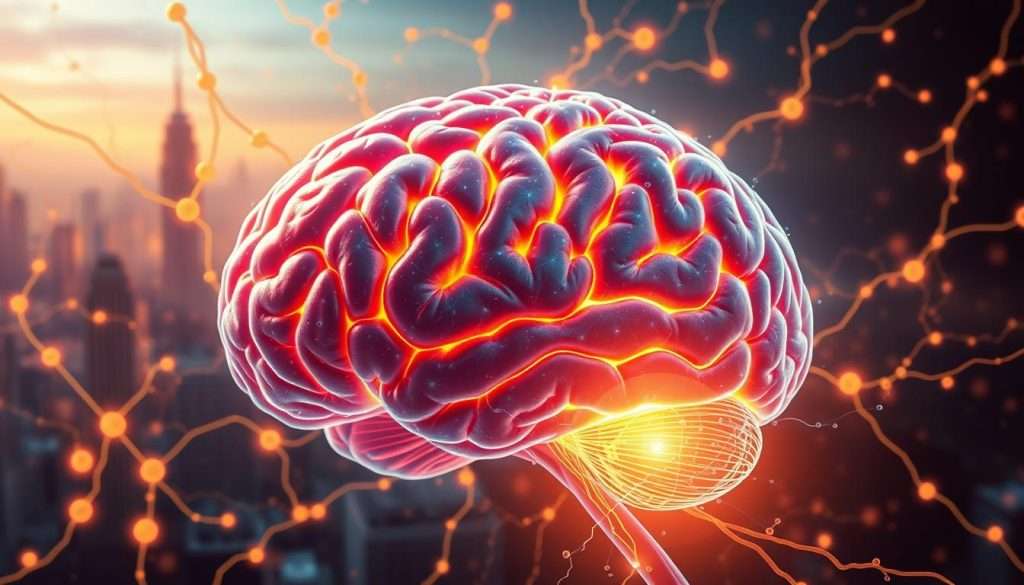Your brain is like a supercomputer that runs your life. But are you taking care of it? As Mel Robbins says, “Your brain is the supercomputer that runs your life. If it’s not working, you’re dead—so why don’t we take better care of it?”
Improving your cognitive abilities can boost your productivity and creativity. It can also improve your overall well-being. We will explore simple yet effective hacks to upgrade your brain’s performance and unlock its full potential.
Key Takeaways
- Discover the importance of brain health
- Learn simple hacks to improve cognitive abilities
- Boost productivity and creativity
- Enhance overall well-being
- Unlock your brain’s full potential
Understanding the Science Behind Cognitive Function
The human brain is incredibly complex. To keep our brains healthy, we must understand how it works. This includes how it handles information, adapts to new things, and reacts to different stimuli.
How Your Brain Processes Information
Our brains deal with a lot of data all the time. They sort out what’s not important and keep what is for later. This job requires many brain areas working together.
Knowing how this happens helps us spot where brain problems might start.
The Neuroplasticity Phenomenon
Neuroplasticity is the brain’s ability to change with new experiences and learning. It’s key to keeping our brains sharp as we age. By using neuroplasticity, we might slow down or even stop some brain aging.
Key Cognitive Domains
Cognitive function covers areas like attention, memory, and how fast we process information. Each area is important for our brain health. Knowing about these areas helps us find ways to boost our brain power.
The Connection Between Physical Health and Brain Performance
Your brain’s performance is closely linked to your physical health. Understanding this connection can change how you think. Taking care of your body is key to keeping your mind sharp.
Exercise and Cognitive Enhancement
Exercise is a powerful tool for improving your brain. Regular physical activity boosts mental agility and cognitive skills. But how does it work?
Aerobic Exercise Benefits
Aerobic exercise, like running or cycling, increases blood flow to the brain. This promotes the growth of new neurons and improves brain health.
Strength Training for Brain Health
Strength training, on the other hand, improves executive function. It also speeds up cognitive processing.
Heart Health’s Impact on Brain Function
Good heart health is vital for your brain to function well. A healthy heart ensures your brain gets the oxygen and nutrients it needs.
The Brain-Gut Connection
The connection between your gut and brain is critical for cognitive health. A balanced gut microbiome is essential for producing neurotransmitters and maintaining brain-gut health.
By understanding the relationships between physical health, exercise, heart health, and the brain-gut connection, you can improve your cognitive skills. This helps maintain a healthy, high-performing brain.
Nutrition Strategies to Fuel Your Cognitive Function
Eating the right foods is key for a sharp brain. What you eat affects your brain’s work, including memory and focus. We’ll look at how to eat for better brain health.
Brain-Boosting Foods and Nutrients
Some foods are great for your brain. Let’s explore the best ones for brain health.
Omega-3 Fatty Acids
Omega-3s are good for your brain. Foods like salmon, walnuts, and chia seeds are full of them. Dr. Daniel Amen says, “Salmon, especially wild salmon, is great for brain health due to its Omega fatty acids.” Eating these foods can help your brain stay healthy.
Antioxidant-Rich Foods
Antioxidants protect your brain from damage. Berries, leafy greens, and other antioxidant-rich foods are important. They fight off free radicals, which can improve memory and thinking.
B Vitamins and Brain Health
B vitamins are important for your brain, especially for making neurotransmitters. Foods like eggs, avocados, and whole grains are full of B vitamins. They help your brain work better and may prevent brain decline.
| Nutrient | Food Sources | Benefits |
|---|---|---|
| Omega-3 Fatty Acids | Salmon, Walnuts, Chia Seeds | Supports brain health, improves cognitive function |
| Antioxidants | Berries, Leafy Greens | Protects against oxidative stress, improves memory |
| B Vitamins | Eggs, Avocados, Whole Grains | Supports neurotransmitter production, reduces cognitive decline risk |
Hydration and Cognitive Performance
Drinking enough water is vital for your brain. Even a little dehydration can hurt your focus and memory. Drinking water all day keeps your brain sharp.
Meal Timing for Optimal Brain Energy
When you eat matters for your brain. Eating regularly keeps your energy up, helping your brain stay sharp. Skipping meals, especially breakfast, can make you feel tired and unfocused.
By following these nutrition tips, you can boost your brain health. A well-fed brain leads to better memory, focus, and mental clarity.
Sleep Optimization for Enhanced Mental Processing
Sleep is as vital as food and exercise for boosting brainpower. It affects our executive function, which is key for making decisions, solving problems, and managing emotions.
Sleep Cycles and Memory Consolidation
Sleep is not just rest; it’s a time when our brain works hard. It helps solidify memories and gets rid of brain toxins. Our brain goes through different cycles during sleep, each cycle is important for memory and brain health.
Creating the Ideal Sleep Environment
To sleep well, we need a restful environment. This means controlling the temperature, light, and sound in our bedroom.
Temperature and Light Control
A cool and dark bedroom improves sleep quality. A cooler room helps us sleep better, and darkness keeps our body clock in sync.
Sound Management Techniques
Reducing noise or using white noise machines can block out disturbing sounds. This ensures a more consistent sleep.
Pre-Sleep Routines for Better Brain Recovery
Having a pre-sleep routine tells our brain it’s time to relax. Activities like reading, meditation, or a warm bath can help. As Jim Kwik says, “Sleep solidifies memories and cleans the brain of toxins,” showing how crucial a good night’s sleep is for our brain.
Stress Management Techniques for Cognitive Protection
Chronic stress can harm your brain health. It’s crucial to manage stress well. When stressed, your body’s “fight or flight” response kicks in, releasing cortisol. Elevated cortisol levels over time can damage brain cells.
How Chronic Stress Damages Brain Cells
Stress can cause brain inflammation. This inflammation damages the hippocampus, key for learning and memory. It also shrinks the prefrontal cortex, impacting decision-making and problem-solving.
Mindfulness Practices for Stress Reduction
Mindfulness meditation can reduce amygdala activity and enhance prefrontal cortex functions, as Dr. Karolien Notebaert found. It focuses on the present, reducing worries about the past or future.
5-Minute Meditation Exercises
Begin with deep breathing. Inhale for four seconds, hold for four, and exhale for four. Repeat this several times.
Breathing Techniques for Immediate Calm
Try the “4-7-8” technique. Breathe in through your nose for four counts, hold for seven, and exhale through your mouth for eight.
Cognitive Reframing Methods
Change negative thoughts to positive, realistic ones. Instead of “I’ll never be able to do this,” say “I’ll learn and grow from this experience.”
| Technique | Description | Benefits |
|---|---|---|
| Mindfulness Meditation | Focus on the present moment | Reduces stress, improves focus |
| Breathing Exercises | Controlled breathing techniques | Immediate calm, reduced anxiety |
| Cognitive Reframing | Reframe negative thoughts | Improved mental resilience, positivity |
Memory Enhancement Strategies That Actually Work
Memory is like a muscle that can be strengthened with the right exercises. To improve memory retention, we need to adopt strategies that are both effective and engaging. Let’s explore some techniques that can help.
Spaced Repetition Systems
One of the most effective methods for enhancing memory is the spaced repetition system. This involves reviewing material at increasingly longer intervals to help solidify it in your long-term memory.
Digital Flashcard Methods
Using digital flashcards is a modern twist on traditional memorization techniques. Apps like Anki allow you to create digital cards and implement spaced repetition, making it easier to retain information.
Scheduling Your Review Sessions
Consistency is key when using spaced repetition. Schedule regular review sessions to keep your memory sharp and ensure that the information you’ve learned isn’t forgotten.
Visualization and Association Techniques
Another powerful technique is to use visualization and association to enhance mental agility. By linking new information to something you already know or find memorable, you can significantly improve your ability to recall it later.
Memory Palace Method
The Memory Palace method, also known as the loci method, involves visualizing a familiar place and associating the information you want to remember with specific locations in that space. This technique can be particularly effective for remembering lists or sequences.
| Technique | Description | Benefit |
|---|---|---|
| Spaced Repetition | Reviewing material at increasing intervals | Improves long-term memory retention |
| Visualization & Association | Linking new info to known or memorable data | Enhances mental agility |
| Memory Palace | Associating info with locations in a familiar space | Effective for remembering lists or sequences |

By incorporating these strategies into your daily routine, you can significantly improve your memory and mental agility. Experiment with different techniques to find what works best for you!
Focus and Attention Training Methods
In today’s world, distractions are everywhere. Improving your focus is key to reaching your goals. Snizhana Sukhoroslova says, “The ability to focus is crucial for achieving success.” We’ll look at ways to boost your focus and attention.
Pomodoro Technique and Time Blocking
The Pomodoro Technique is about working in 25-minute focused blocks, then taking a 5-minute break. This method can really up your productivity. Time blocking lets you schedule big chunks of time for important tasks. Using both can significantly enhance your ability to concentrate.
Digital Distraction Management
Managing digital distractions is key in our digital world. We’ll talk about tools and strategies to cut down on distractions.
App Blockers and Focus Tools
Tools like Freedom and SelfControl block distracting apps during work. They’re a simple yet effective way to regain control over your digital life.
Notification Management Strategies
Turning off non-essential notifications can greatly reduce distractions. You can also use ‘Do Not Disturb’ mode during focused work.
Attention Span Expansion Exercises
Doing brain-challenging activities like meditation and reading can expand your attention span. Regularly practicing these can lead to improved cognitive flexibility and better focus.
Mental Agility and Problem-Solving Boosters
Boosting mental agility is key for solving complex problems and improving brain fitness. We can do this by trying out different activities that challenge our brains. These activities help us think more flexibly.
Brain Games That Enhance Cognitive Skills
Brain games are great for improving mental agility. They include puzzles, brain teasers, strategy games, and memory exercises. Playing these games regularly sharpens your mind and boosts problem-solving skills.
Learning New Skills for Cognitive Flexibility
Learning new skills is also a powerful way to boost mental agility. Jim Kwik says, “Learning new skills can build cognitive reserve and reduce cognitive decline.” By learning new things, you challenge your brain and make it more flexible.
Creative Thinking Exercises
Creative thinking exercises can also boost mental agility. They encourage thinking outside the box and improve problem-solving skills.
Divergent Thinking Practice
Divergent thinking is about coming up with many solutions to a problem. Practicing this makes you more innovative and adaptable.
Constraint-Based Problem Solving
Constraint-based problem solving is about finding creative solutions within limits. This exercise enhances critical and resourceful thinking.
Improving Cognitive Function Through Social Engagement
Social interaction is key to keeping our minds sharp. Snizhana Sukhoroslova says, “Social engagement is crucial for maintaining cognitive health.” This shows how important it is to stay active socially.
The Power of Meaningful Conversations
Having deep talks boosts our mental agility. Talking about things we love is like a brain workout.
Group Learning and Cognitive Benefits
Being part of group learning boosts our knowledge and brain power. It makes us think on our feet and adapt better.

Combating Isolation for Brain Health
Feeling alone can harm our brain health. Staying in touch with friends helps fight loneliness and keeps our brains healthy.
Adding social activities to our day helps our brain stay sharp. It’s a big step towards better mental agility.
Technology Tools and Apps for Brain Training
Brain training apps have become popular, offering many ways to improve our brain health. Thanks to technology, we can easily find cognitive training programs that fit our needs.
Evidence-Based Brain Training Applications
Many brain training apps are based on scientific research. They offer structured programs that focus on specific skills. For example, Lumosity and Peak provide games that improve memory, attention, and problem-solving.
These apps also track your progress. A study in Psychological Science found that some brain training can greatly improve cognitive function.
Digital Tools for Memory and Organization
Digital tools can also help with memory and organization. Apps like Evernote and Todoist help manage tasks and notes. This reduces cognitive load and boosts productivity.
Smartphone calendars and reminders can also aid memory. They help remember appointments and important dates.
| Tool | Function | Benefits |
|---|---|---|
| Lumosity | Brain training games | Improves memory, attention, and problem-solving skills |
| Evernote | Note-taking and organization | Enhances memory and productivity |
| Todoist | Task management | Reduces cognitive load, improves task completion |
Using Technology Mindfully
Technology can be great for our brains, but we must use it wisely. Too much screen time can cause eye strain and lower attention span.
Screen Time Management
It’s important to control how much time we spend on screens. Setting limits on apps and digital tools helps keep a balance. Apps like Freedom and Moment help track and limit screen time, promoting better digital habits.
Digital Information Filtering
With so much information online, it’s key to filter out what’s not important. Tools that help sort information, like news aggregators and focus-enhancing browser extensions, keep our minds clear.
By being mindful of our tech use, we can enjoy its benefits for our brain health while avoiding its downsides.
Creating Your Personalized Cognitive Enhancement Plan
Now that we’ve looked at different ways to boost your brain, it’s time to make a plan just for you. A good plan starts with knowing your brain’s strengths and weaknesses. Then, set goals you can reach and keep track of how you’re doing.
Assessing Your Cognitive Strengths and Weaknesses
To make a plan that works, you need to know what your brain can do well and what it struggles with. Cognitive assessment tools can show you how you’re doing in areas like memory, focus, and solving problems.
Cognitive Assessment Tools
There are many tools to help you understand your brain, from online tests to professional checks. Some well-known ones are:
- BrainHQ: A brain training program that tests and boosts different skills.
- Cogmed: A program that focuses on improving working memory and starts with an assessment.
- Cognitive assessment apps: Apps that offer tests and training based on your needs.
These tools give you a clear picture of your brain’s strengths and areas to work on. This helps you make a plan that fits you perfectly.
Setting Realistic Brain Fitness Goals
After knowing your brain’s abilities, it’s time to set goals that are realistic and reachable. Your goals should be clear, measurable, and match what you want to achieve. For instance, you might want to get better at remembering things or focus better by using certain techniques.
“The key to improving cognitive function is to create a personalized plan that is tailored to your needs and goals.” – Jim Kwik
Tracking Progress and Adjusting Strategies
Keeping track of how you’re doing is key to your plan’s success. Use the same tools you did at the start to check your progress. This shows you what’s working and what needs more work.
Habit Stacking for Implementation
To make your plan work, try habit stacking. This means adding new habits to ones you already do. It makes it easier to fit brain training into your daily life.
| Habit | Existing/New | Frequency |
|---|---|---|
| Mindfulness Meditation | New | Daily, 10 minutes |
| Brain Training Exercises | New | 3 times a week, 20 minutes |
| Reading | Existing | Daily, 30 minutes |
By adding new habits to your daily routines, you can keep improving your brain. This makes it easier to keep up with your goals over time.
Conclusion: Integrating Cognitive Hacks Into Your Daily Life
We’ve looked at many ways to boost your brain. Now, it’s time to add these tips to your daily life. This will help you improve your brain’s function and fitness.
Mel Robbins reminds us, “You have the power to take control of your brain health and improve your cognitive function.” Small changes in your daily habits can unlock your brain’s full potential. This leads to better mental clarity and focus.
Start by choosing a few strategies that appeal to you, like mindfulness or the Pomodoro Technique. As you get used to these habits, you can add more to your routine.
By focusing on brain fitness and cognitive enhancement, you’ll see better mental performance and overall well-being. So, take the first step today and start optimizing your brain’s potential!

